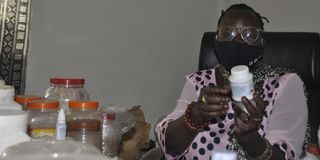Covid drug maker fears for her life

Dr Alice Lamwaka, the developer of Covilyce-1 drug, during the interview at her office at Gulu University’s Faculty of Medicine in Gulu City on Wednesday. PHOTO/ TOBBIAS JOLLY OWINY
What you need to know:
Dr Alice Lamwaka has appealed to Gulu University management to boost her personal security and that of the university laboratory.
The principal researcher in the development of Gulu University’s Covilyce-1, a supportive Covid treatment drug, has raised fears about her life and the safety of their laboratory.
Dr Alice Lamwaka told Daily Monitor in an interview on Wednesday that intermittent threats have been conveyed to her through direct telephone calls and short text messages (SMS) by strangers she suspects to be members of a cartel.
The individuals, the don said, appear desperate to hijack the Covilyce-1 busines, with stakes rising following an attempted break-in into the university laboratory where the drug is being prospected.
Following the threats, Dr Lamwaka has appealed to Gulu University management to boost her personal security and that of the university lab.
“People are claiming that the drug is very effective and cures the viral disease and now the cartels and dealers are demanding that I bring it out. I cannot give out the supplies of this drug because the product is still under development,” she said.
According to her, people who want to trade in the drug are pulling all strings – from persuasion to intimidation in order to get the medicine.
“They want the orders and supplies badly and they are forcing me to bring it out; these giant business cartels. They have become a huge threat, they have even tried to break into our centre to look for where we have stored these drugs,” Dr Lamwaka said.
This newspaper could not independently verify the threat allegations with Gulu University, but police said their counter-terrorism directorate handles safety concerns of high-profile individuals such as the academic.
Dr Lamwaka said she had received an SMS on her mobile phone handset in which the sender demanded an urgent meeting to strike a deal for supply and sale of the herbal medicine, with or without National Drug Authority (NDA) approval.
“Imagine someone texted me saying ‘I want to be the distributor, give it to me and I want to be the sole distributor, where are you, I want to find you and talk business with you’. Such people may kill me. Even when I insisted that the product is still in the lab under development, he said ‘no, give me no matter how crude it is, I need it and I need it badly’.”
Dr Lamwaka said she was more threatened and traumatised following an attempted burglary at the laboratory.
Security officers familiar with the issue, who preferred anonymity for lack of authority to speak on the sensitive matter, said Dr Lamwaka had sought intensified night patrols by armed personnel at the lab and her home to reinforce unarmed varsity security guards.
Although the researcher said she had communicated to the heads of security in both Gulu City and Gulu District, Mr Stephen Odong Latek, the Resident District Commissioner, said Dr Lamwaka’s concerns could only be answered by his counterpart, Mr Denis Odongpiny, the Resident City Commissioner.
Mr Odongpiny yesterday said he met Dr Lamwaka, but they discussed other matters.
“The question of her insecurity is new to me, I am not aware because we last met when she wanted a travel permit although she told me there was something we needed to discuss at length and we never got into that until now,” he said.
Nearly a fortnight ago, while meeting a team of scientists from Gulu University at State House, Entebbe, President Museveni asked Dr Lamwaka and the university to progress with the development of Covilyce-1.
At the meeting, the President also directed the Finance ministry to give Dr Lamwaka and her team Shs3.7 billion.
Once received, the money will be used to conduct clinical trials, set up the drug processing plant and install the necessary equipment for a functional factory.
Dr Lamwaka is also supposed to begin testing the drug officially at Gulu Regional Referral Hospital, instead of the ongoing informal approach where clinical trial data is not being computed.
The Health minister, Ms Jane Ruth Aceng, pledged to authorise the trials.
When contacted, Mr David Ongom Mudong, the Aswa River Region police spokesperson, said Dr Lamwaka’s safety will be handled by the counter-terrorism police.
“Her invention of Covilyce-1 is too critical and you are aware even the President is directly involved. [For] such significant developments, it is usually the Counter-terrorism police that handles them,” he said.
Mr Ongom, however, noted that the police had not yet received any official complaint from Dr Lamwaka regarding her safety.
About covilyce-1
Covilyce-1 is a herbal drug recently developed by a group of scientists at Gulu University’s Faculty of Pharm-Biotechnology and Traditional Medicine Centre (Pharm-Biotrac).
The drug comes in four formulas; Linctus (made from four plants), Covilyce-1 Powder (a combination of eight plants), Covilyce-1 Suppository (made from 3 plants) and Covilyce-1 Nasal drops (made from 6 herbs).
Whereas patients with comorbidities like hypertension, asthma, ulcers and diabetes, use a combination of Covilyce-1 powder, Linctus and Nasal drops that clears the infection in approximately 12 hours.
“Then patients who are unconscious, can’t swallow, on oxygen or have difficulty breathing, use the Covilyce-1 Suppository, which is administered via the rectum.” Dr Lamwaka said in an earlier interview.




